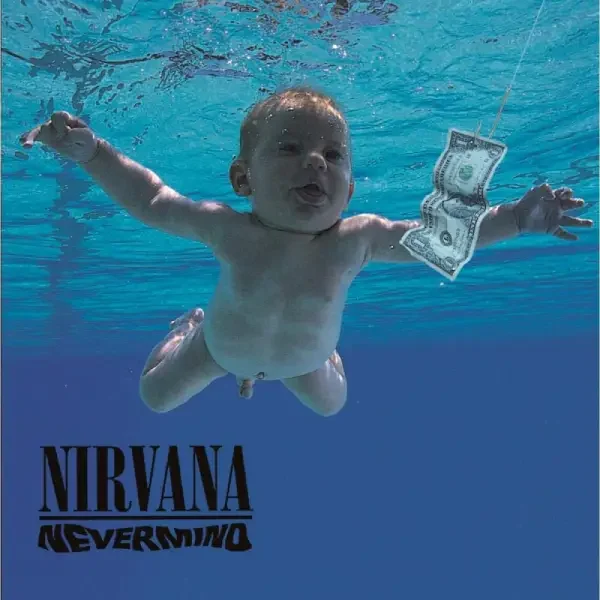Nirvana
– Nevermind
The first few seconds of “Smells Like Teen Spirit” tell you everything: quiet tension, sudden eruption, and a chorus that’s as catchy as it is unintelligible. Nirvana weren’t the first to fuse punk’s abrasion with pop melodies, but they nailed the balance so precisely it felt like a brand-new language.

What’s remarkable is how this album remains both accessible and unsettling. Kurt Cobain’s voice shifts between raw pleading and hoarse screaming, while the band—Dave Grohl hitting drums like he’s trying to crack the earth’s crust, Krist Novoselic’s bass lines holding it all together—wraps jagged noise in candy-shell hooks. There’s a sense of urgency that never quite resolves; every song seems ready to collapse under its own weight, but instead finds a strange grace in the chaos.
The real trick is that Nevermind wasn’t chasing the mainstream; it just happened to be irresistible. Even in its cleaner production compared to Bleach, you can still hear the grime in the gears—the slight off-kilter feel in “Come as You Are,” the twisted carnival riff of “Lithium,” the unhinged meltdown of “Territorial Pissings.” This wasn’t a fluke album; it was a pressure valve for a generation that didn’t have a name yet.
Choice Tracks
Smells Like Teen Spirit
Still smells like a revolution. That four-chord riff is simple enough for a first-year guitarist, but it opened up the whole damn pit. Cobain’s slurred vocals build into that now-iconic yell, and when the chorus hits, it doesn’t feel like a release—it feels like a riot. Anthemic by accident.
In Bloom
The sarcasm drips off this one like sweat at a basement show. It’s got a bright, almost Beatles-esque melody paired with a bite aimed at the posers who missed the point. Infectious and quietly savage, it’s Nirvana at their most passive-aggressive.
Come As You Are
A warped invitation set to a haunting riff that drips with underwater menace. Cobain’s lyrics feel like riddles wrapped in barbed wire, and the whole song swings in a strange, hypnotic haze. It’s beautiful, but uneasy—like something friendly hiding sharp teeth.
Lithium
The manic/depressive ping-pong match. The verses are calm, almost content, before the chorus kicks the door open and sets fire to the furniture. It’s the sound of someone barely hanging on—and occasionally letting go.
Drain You
Arguably Nirvana’s best song in terms of structure, energy, and weirdness. That middle breakdown? Pure glorious chaos. And yet, it swings. It’s romantic, grotesque, and kind of hilarious, which is the Cobain trifecta.
Nevermind didn’t save rock music. It dragged it out of its neon coma, shaved its head, and handed it a flannel shirt. Thirty-plus years on, it still hits like a punch in the gut and a kiss on the forehead, all at once. And it never once asks you to be okay with that.
No one expected a band from Aberdeen, Washington to throw the entire rock landscape into a blender, but Nevermind didn’t ask for permission. It showed up, kicked in the door, and rewrote the rules before breakfast. This album didn’t just shift the culture—it hijacked it. With twelve tracks and a baby chasing a dollar on the cover, Nirvana dismantled hair metal’s glitzy empire and built a jagged little kingdom out of fuzz, feedback, and frustration.
Cobain, Novoselic, and Grohl hit like a three-man wrecking crew. Cobain’s voice cracked, sneered, and yelped in all the right wrong ways. His guitar, more grenade than instrument, sprayed melody and noise in equal measure. Grohl played like he was trying to beat the drum kit into a new dimension. And Novoselic’s bass? Heavy, simple, and strangely elegant—like the spine of a band that wasn’t supposed to walk upright, but did anyway.
And then there’s the emotional weight. Nevermind is angsty, yes, but it’s not some moody teenager sulking in the corner. It’s wired, coiled, aching. The hooks are huge, the choruses blast like jet engines, but it never sounds safe. Even in its cleanest moments, there’s rot under the paint. That friction—between pop sensibility and raw nerve—is what makes the album timeless, not nostalgic.
Nevermind is both a genre-defining milestone and a stubbornly strange record. It redefined what rock radio sounded like, not by bending to the mainstream, but by dragging the mainstream toward the basement.

